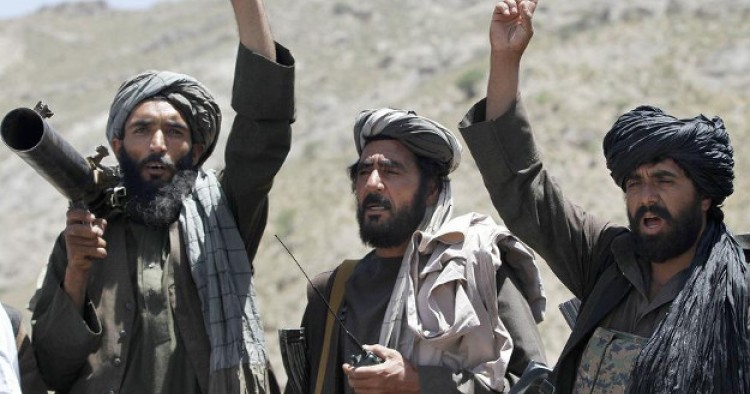A prominent Afghan politician has cautioned that it is not in the interest of Iran to have close relations with the Taliban, Afghan media reported. “As an Afghan, I explicitly state that cultivating close relations – I hope it is a mistake – with an enemy, which has no difference with ISIS in its essence and substance, is harmful not only to the Iranian people but also to the people Afghanistan,” Amrullah Saleh, the head of the Afghan Green Trend and former intelligence chief, said at the Tehran Security Conference. He further reminded the audience at the conference that the Taliban harbors sectarian hatred toward the Shiites and massacred ethnic Afghan Hazaras when the terrorist group was in power prior to the 2001 US intervention. Iranian Foreign Minister Javad Zarif also spoke at the conference.
Comment: Since the fall of the Taliban 16 years ago, Iran has played both sides of the conflict in Afghanistan. On the one hand, Tehran has cultivated close ties with Kabul and contributed to Afghanistan’s rebuilding process. Iran has also emerged as Afghanistan’s largest trading partner as relations between Kabul and Islamabad has been deteriorating. At the same time, however, the Islamic Revolution Guards Corps (IRGC) has been providing training, money, arms and sanctuary to Taliban militants to pressure the U.S. military forces to leave the country. The Iranian government has also used its ties with the Taliban to seek political concessions from the Kabul government.
Lately, the Afghan government has become more vocal about Iran’s relationship with and support for the Taliban. In September, for example, the Chief of General Staff for the Afghanistan National Defense and Security Forces said that the Kabul government has evidence that Iran is providing weapons and other military assets to the Taliban in western Afghanistan. In an interview with the BBC Persian, Lieutenant General Mohammad Sharif Yaftali added that President Ashraf Ghani discussed the issue with his Iranian counterpart Hassan Rouhani in Tehran in August but did not disclose details of the meeting. He stressed that the Afghan government wants to resolve the issue through “dialogue and understanding”
Lately, Iran has been particularly alarmed by the growth of ISIS in Afghanistan. Tehran fears that the terrorist group can infiltrate into Iran by recruiting disenchanted Sunni youth in its southeast and northwest regions. The Iranian province of Sistan and Baluchestan, which borders Afghanistan and Pakistan, has long suffered low-intensity insurgency. To counter the threat, Iran, according to Afghan officials, has expanded its support to Taliban groups in western Afghanistan to create a buffer zone and keep ISIS at bay. But given that most ISIS militants in Afghanistan are Taliban splinters, as Saleh elaborated on during his remarks at the Tehran conference, the IRGC is indeed exacerbating the terrorism problem that destabilizes Afghanistan and increasingly threaten Iran as well.
Likewise, the top American commander in Afghanistan told Congress last February that Iran and Russia are supporting the Taliban to undermine the U.S. mission to stabilize the war-ravaged country. Army Gen. John Nicholson told the Senate Armed Services Committee that the Iranian government is providing the Taliban with weapons and financial assistance, particularly in western Afghanistan. He also noted that Tehran is also recruiting Shiite fighters in Afghanistan and deploying them to defend the Syrian regime of Iran’s ally Bashar al-Assad. "Russia, Iran, and al Qaeda are playing significant roles in Afghanistan—this wasn't the case a few years ago," the American general testified. “I believe [these actions] are in part to undermine the United States and NATO, and prevent this strong partnership that we have with the Afghans in the region,” he told lawmakers during a Congressional hearing.
On the surface, Iran’s support for the Taliban does not appear logical: Taliban is a reactionary militant group that massacred Afghan Shiites in late 1990s, and Iran and the Taliban almost went to war when the latter killed Iranian diplomats in northern Afghanistan. The Taliban's return to power in Afghanistan would undermine Iran’s geopolitical interests in South and Central Asia and pose a serious threat to Iran’s internal security as well – particularly in its restive Sunni-majority province of Sistan and Baluchestan. But by providing measured support to the Taliban, the Iranian government is pursuing several key objectives in Afghanistan: to accelerate the withdrawal of U.S. troops from its eastern border; to establish a buffer zone in western Afghanistan against a potential threat of Islamic State; to use its ties with the Taliban for its geopolitical agenda in South and Central Asia as well as in the Middle East; and to pressure the Afghan government for political concessions.
The Middle East Institute (MEI) is an independent, non-partisan, non-for-profit, educational organization. It does not engage in advocacy and its scholars’ opinions are their own. MEI welcomes financial donations, but retains sole editorial control over its work and its publications reflect only the authors’ views. For a listing of MEI donors, please click here.












